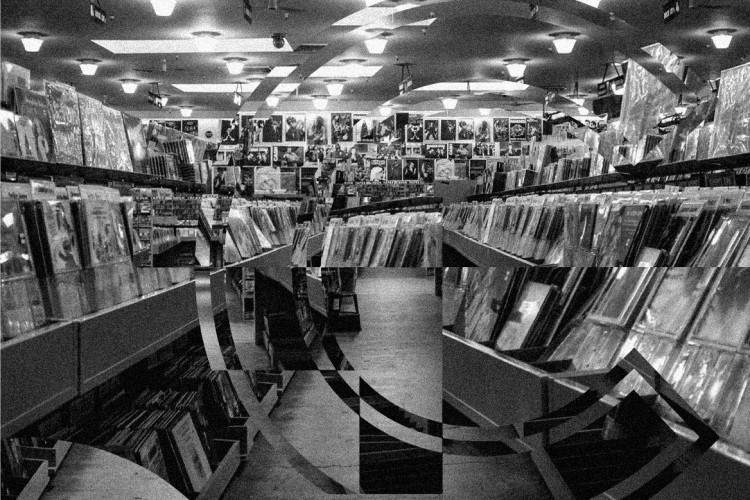Part IV: Four Feet
Part four of a six-part science fiction series by Khairani Barokka

Grandmother, two feet. Granddaughter, two feet. I came back to Jakarta–after the final stretch of stinking squelch beneath my toes in harried tunnels, then ocean kilometers so treacherous with sharks, there seemed to be glass teeth lurking in every breaststroke. After arriving where we meant to. The paddy fields under the sea were terrifyingly similar to childhood dreams, the ones that sparked ancestral storytelling and secret escape to find them. That make me feel guilty now for not touching a sajadah in years, because there might be something after all to preordained destiny, this means. But we wouldn’t have been able to drag any prayer mat through the mud, or the sea, that much can spare me obsessive-compulsive guilt. They make their own prayer mats in the undersea secret spaces, weaving blades of leaf, in the bubble of luck that is fields and forests where none have any right to be.
I’m telling my grandmother about the weaving of mats, because I know she’ll pass judgment against her will, and wonder how often they pray down there; if their knowledge of how to sound out Arabic without even knowing the meaning is up to snuff. Faith is rarely logic and always sense of a different kind entirely. I am willing her to leave, to return undersea with me. She wonders if she can leave my grandfather’s grave so far away, and still have a chance at getting to her kind of heaven to see him. It’s not a hard choice. Outside, the birds have almost all fallen to their deaths mid-flight, choking on air thick as smokestacks. Inside, it’s as though your throat is a fist without a black mask to pillage for oxygen. Vermin are turning the hundreds of malls into Bantar Gebang, what used to be the rubbish dump outside the city that went porous with borders; trash leaks, if you didn’t know, sometimes across the front yards of 15 million. For awhile, the malls were where people squatted, and in some act of mercy, no company or government could pay any kind of guards enough money to stay in those places overnight, to swat the beasts and bodies away. It was nice to visit. My friends and I would go run up and down the escalators, while my grandmother stayed home. Rather furious that her serrated vision meant she couldn’t chase after me in those filthy, obstacle-strewn places as well as she could in her home. She showed nothing but relief when I emerged from dark pits of buildings to straggle back to our streets in the morning. She showed nothing but relief when I came back through sea and tunnel after a year to bring her down home with me, my new peace.
The sky is crackling, and I’m trying to persuade my grandmother to move undersea–but I’m wondering if her arthritis and the lack of light in the tunnels will survive the stretch, and how well she can swim, and if sharks like old bones better, because brittle means crunch. If I’ll have to fashion a makeshift something-or-other with others’ help to carry her. It’s not that I haven’t thought about all this in the slightest, the logistics, just not thought through. Like blinking to make things right, I thought I’d just leave and come for her, and the rest would sort the way. She knows I’m bumbling, she’s not giving in.
In the front window behind my grandmother’s head in the living room, I see a land-car of this one fancy make we all thought was extinct. It’s crawling. There’s too much detritus in the streets, and it’s snail’s-pacing, engines envious of the vehicles up in the sky, puttering with tinted windows. I bet there’s a driver in the front seat for the ridiculous fool in back. Inching along, a back window rolls down slightly, and we see a fat hand with a ruby ring, the top half of a suit, and a cigarette to tap against the car, then fling against our gate. There is just enough time before he rolls up the window again to hear it from inside, ringing of the motorists’ delusion and upholstery:
“Hey Jude… Don’t make it bad.”
My grandmother snaps her neck towards the song. The cigarette has landed dangerously close to a small pile of leaves by the gate. Leave here, leave with me, I think as though I’ve said it out loud, but all I’ve done is tell her where I’ve come from. She might as well have heard my synapses forming a line out the door, carpeted for her. Regret might as well be redemption enough for letting this place be her only company for a year–but this is just what we tell ourselves, we daughters of the mess that is the capital. I look at my bare feet, and I want her to notice how strong I’ve gotten, how sinewy tough even my toes seem to have turned. I look at her own feet that radiate soft, and then at her neck of skin-paper and moles. Her head is still turned towards the window, and I know what song has landed there, dancing round like a falling cigarette and flames.
Read the other parts here:
Part I
Part II
Part III
Part V
Part VI











